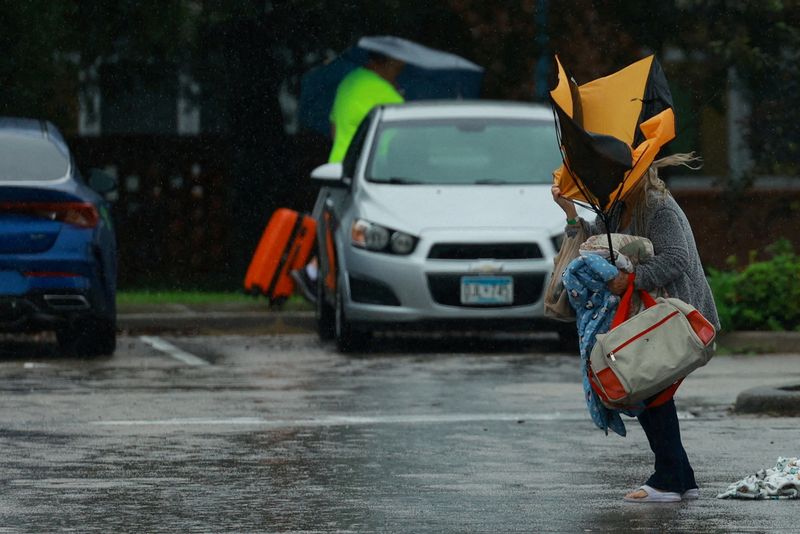By Suzanne McGee and Svea Herbst-Bayliss
(Reuters) – Florida’s sun and low taxes enticed many hedge funds and other financial professionals to move south. Now another massive hurricane is putting that love affair to the test, but many big-name managers are committed to remaining in “Wall Street South” for the foreseeable future.
The state, facing the approaching Category 3 Hurricane Milton on Wednesday, has lured investors for years but its attractiveness only increased during the pandemic. Billionaire Carl Icahn uprooted his firm from New York to an office near Miami in 2020. Paul Singer’s Elliott Investment Management followed later that year with an announcement that it was opening a West Palm Beach office. And Ken Griffin’s Citadel said in 2022 that it was moving to Miami from Chicago.
Hurricane Milton is on course to pound Florida’s Gulf Coast late on Wednesday night or early on Thursday, threatening communities still recovering from Hurricane Helene last month. Milton was expected to stay at hurricane strength across the Florida peninsula, posing storm-surge danger on the state’s Atlantic Coast.
“We took the plunge with our eyes wide open,” said Jack Ablin, chief investment officer at $52 billion Chicago-based Cresset Asset Management, about his move to Palm Beach on Florida’s east coast in 2015. His principal residence will stay in Palm Beach even though he plans to ride out this storm from his other home in the Blue Ridge Mountains of South Carolina.
For many other fund managers, the tradeoff between lower taxes and a favorable business climate versus the specter of insurance payments and the cost of rebuilding potentially annihilated real estate, still works in favor of Florida, according to people familiar with their thinking.
The big hedge funds that moved to Florida remain committed to maintaining their operations there, those people said. Similarly, other executives who moved their personal residences to the South during the pandemic while continuing to telecommute for firms based in the Northeast have every intention of staying put, according to two sources familiar with their thinking.
Other Wall Street financial institutions, including Goldman Sachs and JPMorgan Chase (NYSE:JPM), have built up staff in Florida both to serve customers who moved and to accommodate employees eager to work from the South.
CONTINGENCY PLANNING
Many of the firms that moved – including Citadel, Elliott and Icahn – are based on or near Florida’s east coast where easy flights to New York and other locations were a draw, as was Miami’s bustling nightlife and vibrant arts scene. That has put them some 300 miles (483 km) east of where forecasters expect Milton to make landfall and wreak the most serious damage after
Hurricane Helene swept through late last month.
Still, they are working on contingency plans.
“If the need to evacuate were to arise in Miami, we have robust contingency plans for our employees, their loved ones and our businesses,” said a Citadel spokesman. But the firm’s commitment to Florida, where founder Griffin was born, is clear. The company plans to build a 54-story tower as its new headquarters in Brickell, the buzzing Miami neighborhood that has become the heart of “Wall Street South.”
A handful of financial industry firms, however, are based in the immediate path of Milton.
One founder of an $8 billion fund on Florida’s west coast flew in to the state to keep an eye on both his firm and his home, and now plans to ride out the storm on a high floor of his office building, people familiar with his thinking said.
Another firm in the path is Raymond James Financial (NYSE:RJF), founded and still based in St. Petersburg. The 62-year-old brokerage and investment advisory firm evacuated staff from its head office on Tuesday.
The firm is maintaining service and support at back-up facilities and a spokesman declined to provide additional comment to its communications on social media.
Blue Ocean Technologies ATS, a Florida-based financial technology company operating an overnight trading system for U.S. securities, has its executive offices just north of Miami in West Palm Beach, and has a backup plan.
“I’ve been living here for 10 years, and the hurricanes have missed me for 10 years,” said Brian Hyndman, president and CEO of Blue Ocean. The firm’s trading system, its trade-matching engine, is based in New Jersey. “We can work remotely from home, and we’ve got backup and support on both the east and west coasts of the United States.”
LONGER-TERM IMPACT?
Two sources familiar with executive recruiting in Florida told Reuters they are concerned that experienced staff may become more reluctant to shoulder the growing expense and risk of living in a hurricane zone, and that hiring may become more costly or difficult.
Average homeowner premiums in Florida rose 57% between 2019 and 2023 according to data from Benjamin Keys of the University of Pennsylvania and Philip Mulder of the University of Wisconsin, a steeper rise than anywhere else in the nation. Average insurance costs were $4,060 last year, according to Keys.
Mel Montagne, president of FIRM, a nonprofit that lobbies for fairer insurance rates for Floridians, and who also sells commercial insurance, said clients have been getting nervous and wracked with buyer’s remorse.
“They are looking around and saying, ‘what the hell is this?’” said Montagne, whose clients include finance industry executives who migrated to Florida during COVID.
“They are looking to sell to get the hell out of Dodge.”

